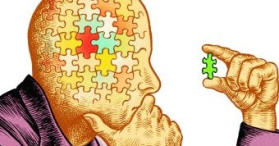Developing Greater Self-Awareness

Developing self-awareness is important work. It is not easy. Most work to better understand ourselves and become better leaders isn’t easy. This is what makes it significantly important.
We all have good character traits and abilities with the level of self-awareness we bring to the world as we find it. We also have opportunities to grow our self-awareness.
Opportunities:
There is an inner-critic in all of us. The inner-critic has been well trained through family of origin, hard life experiences, social environments, moments of success, moments of failure and more. Identifying the negative “tapes” and messages we tell ourselves is the first step to face the critic! To face ourselves. To look in the mirror. To put down the personal “bat” we beat ourselves up with. If we don’t make time to identify the negative messages and behaviors we live out, both consciously and subconsciously, we get in our own way through self-sabotage.
According to Shirzad Chamine, expert on Positive Intelligence, our inner-critic shows up as a “judge”. The “judge” works its way through saboteurs. Some of the saboteurs that show up are the stickler, pleaser, restless, controller, avoider, hyper-achiever and victim. Shirzad says that, “The Judge uses one or more ‘accomplice’ Saboteurs to hijack your mind…The Judge is the universal Saboteur that afflicts everyone…your Judge is your greatest internal enemy, activates your other top Saboteurs, causes you much of your stress and unhappiness, and reduces your effectiveness.” The Judge is the master. Utilizing tools like Shirzads Positive Intelligence assessment, helps one to become increasingly aware of self tendencies, both good and not so good.
The gaps that negatively impact individuals presence in the world must be determined and prioritized for what creates the most personal “pain” and obstruction. This focus gets to the greatest leverage point, that when addressed, will help one to grow into a healthier version of themselves. To grow a deeper self-awareness. When the areas of our lives lacking self-awareness are identified; the reframing, rewiring and behavior change can begin. This important work decreases the negative impact of the inner-critic. When this hard work is embraced, it often results in increased self-confidence and positive leadership influence.
Good character traits and abilities:
In one’s self-awareness process, there are many things that have great impact in one’s areas of influence (professional and personal). A common thought regarding strengths and abilities is to focus attention on them. To grow them towards better.
The person that has healthy self-awareness exudes humility, healthy self-regard, empathy, well developed self-actualization, stress tolerance abilities, healthy relationships and ease with problem solving. This person also knows their triggers. When “triggered,” they focus on responding rather than reacting. Their self-control muscle is strong. A great example of this type of person is found in New York Giant’s quarterback, Eli Manning. In November of 2017, he had been the Giant’s starting quarterback for 13 years. Manning was one of only 12 quarterbacks who won multiple Super Bowls. In the fall of 2017, the Giants were having one of their worst seasons ever with a 2-9 record. They announced that they wanted to give more playing time to Manning’s younger backups, Geno Smith and Davis Webb. This is where Manning’s well developed self-awareness enters the story. In an interview with Jordan Raanan (ESPN - November 2017), Eli said the following:
“Coach McAdoo told me I could continue to start while Geno and Davis are given an opportunity to play,” Manning said. “My feeling is that if you are going to play the other guys, play them. Starting just to keep the streak going and knowing you won’t finish the game and have a chance to win it is pointless to me, and it tarnishes the streak. Like I always have, I will be ready to play if and when I am needed. I will help Geno and Davis prepare to play as well as they possibly can.”
Eli Manning knew who he was. He lived with self-respect that allowed him to respect others and support their talent, even when it required “sacrificing” his own accolades. His humility and well developed understanding of what he brought to the world, and the world of football, gave him the ability to be aware of others and their needs. He was/is a leader with vision, clarity, purpose, humility and empathy…with great self-awareness. He found great satisfaction and joy regardless of the circumstances. Regardless of significant change. His active awareness gave him the ability to negotiate change and manage relationships towards the greater good.
The individual that is self-aware is someone who has a healthy self-respect. They trust themselves. They trust others. They recognize the areas of their lives that diminish their leadership influence. They listen with skills that build trust. They seek to be interested rather than interesting. They embrace the hard work of getting better…every day! They influence their world for good wherever they show up. Our world needs more leaders who have healthy self-awareness. Imagine a world where this exists. Don’t just imagine. Choose to live, grow and lead with a well-developed self-awareness.
Learn more in Self Awareness II: Intermediate Self Awareness
Identify your path to CFO success by taking our CFO Readiness Assessmentᵀᴹ.
Become a Member today and get 30% off on-demand courses and tools!
For the most up to date and relevant accounting, finance, treasury and leadership headlines all in one place subscribe to The Balanced Digest.
Follow us on Linkedin!
